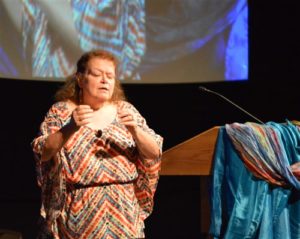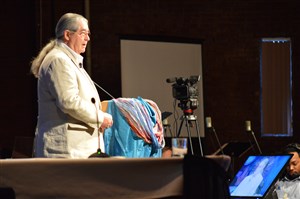In 2015, at Annual Conference, the New England Conference held their Act of Repentance service. Jesus taught in parables, in stories, including the parable of the sower that offers images of the kind of conditions in which things cannot grow, in which things cannot flourish and increase and yield their most. And Jesus reminds us that we must listen deeply in order to learn and to change. In our opening worship, we engage in the beginning of an Act of Repentance regarding the Church’s history of the oppression of indigenous persons.

This service is not a one-time ritual that brings this tragic history to a close; rather it is part of the process of repentance that requires action beyond this day. For this worship, it is an act of listening, of acknowledging, and a commitment to continue learning, healing and “turning around” our actions and policies as a church and in our local communities.
During the Act of Repentance, the Rev. Thom White Wolf Fassett recounted some of the history of Native Americans, the Trails of Tears (as he said there were more than one), the use of the Doctrine of Discovery to justify atrocities, the Indian boarding schools where mass graves of children have been found, and the fact that our founding fathers drew ideas from the democratic principles of the Haudenosaunee, the six nations of the Iroquois.

“If you don’t like history, you don’t have to,” he told members. “You’re not going to take a test; you don’t have to remember dates. But what we have to know is what this vast panorama looks like, what this sweep of history is. What is it to talk about history as theology? … Can we trace history and mark the places where people of faith influenced the outcome of these historic moments.”
And this history, Fassett said, is still alive today because laws that grew out of this past are still on the books and still influencing how people live – including the Doctrine of Discovery, which is still be referenced in current decisions by the Supreme Court.
The Act of Repentance, he said, is not just about the indigenous people of the Americas but those throughout the world who have faced similar challenges – including the indigenous people of Australia, who were not recognized as human beings until the 1960s.
The questions for United Methodists, he said, are “What is the circle of hope? How are we part of the circle? Where are we holding on to each other’s hands?”
“… we may be uncomfortable with that kind of proximity,” Fassett said, “It may be difficult for us to open our hearts … but How do we learn how to express “mitakuye oyesin” (pronounced matakquiase) or ‘all my relations’?”
Because “like it or not, we are all related,” he said.
There is a process developing among indigenous people – particularly in the Americas – to reclaim that sense of family and community.
The Lakota Sioux of the Dakotas are in the midst of a process for “developing community, of claiming family and understanding … how they are to be community together, and find unity (in order) to reconnect the sacred circle.” For native Hawaiians that connection is called ohana or family.
“This is happening in Native nations … around the world where we are struggling to find community,” Fassett said. “If we are thinking and Rethinking Church, why not be thinking about how to reclaim the sacred circle and claim community and claim family, emotionally, and claim unity in the context of the gospel of Jesus Christ?”
Members were invited to take rocks from the “rivers” around the Armory to bring back to their churches as “messenger and witness” to the repentance and actions promised here this day. Among those promises were the commitments made by members of the Conference Cabinet.
Pat Warrior Woman Parent, chair of the Conference Committee on Native American Ministries (CONAM), also spoke during the Act of Repentance.
The Cabinet spoke of their commitment to going beyond the words of the Act of Repentance to actions that the conference will take to build relationships with Native peoples.
Cabinet members committed as individuals to:
- Learn all we can about the history of Native and indigenous peoples in our area and beyond.
- Share what we learn with others. Spread the word, talk with family, friends and co-workers about history; help educate town leaders, civic organizations and community members; host educational awareness events.
- Continue to explore our own privilege, prejudices and assumptions about Native peoples.
- Look for ways to become an ally to Native and indigenous peoples.
- Learn about who we are and from where we have come, and honor our own heritage.
- Speak up.
And on behalf of the Conference, they agreed to:
- Build relationships with Native peoples based on equality within the conference and beyond by listening and learning rather than teaching and leading.
- Build trust by respecting Native expressions of Spirituality by involving Native Americans in planning and/or leading activities such as Native American Sunday for our local church worship services, Native American Camp experiences at our camp and retreat ministries, and educational opportunities.
- Help keep Native culture alive by providing opportunities for children and youth to experience and explore the indigenous culture.
As a Conference:
- Affirm the commitment to empowering the presence of Native and indigenous people in the life of the New England Annual Conference.
- Strengthen awareness and support of Native American Ministries Sunday in the New England Conference.
- Strengthen and be supportive of the New England Committee on Native American Ministries (CONAM).
- Support General Advances and churchwide funding for 22 Native ministries
- Commit ourselves to resourcing and development of new Native and indigenous ministries
- Commit to developing relationships of mutuality with Native peoples in local contexts.
- Continue to provide education for non-Native people about why the Act of Repentance is important.
In partnership with Native ministry leaders and resource people throughout the Connection, the New England Conference will support:
- Developing new Native and indigenous leaders across the Connection including an increased number of people nurtured for service in congregational, annual conference, jurisdictional and central conference, and general church ministries, including the episcopacy.
- Support General Church initiatives related to land and treaty rights, support for tribal sovereignty and cultural preservation; better health care and education for Native people and the safety of Native and indigenous women.
The offering was received for the Conference Committee on Native American Ministries (CONAM).